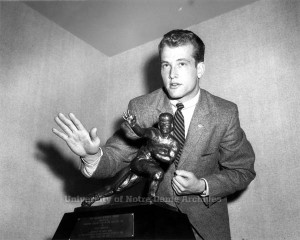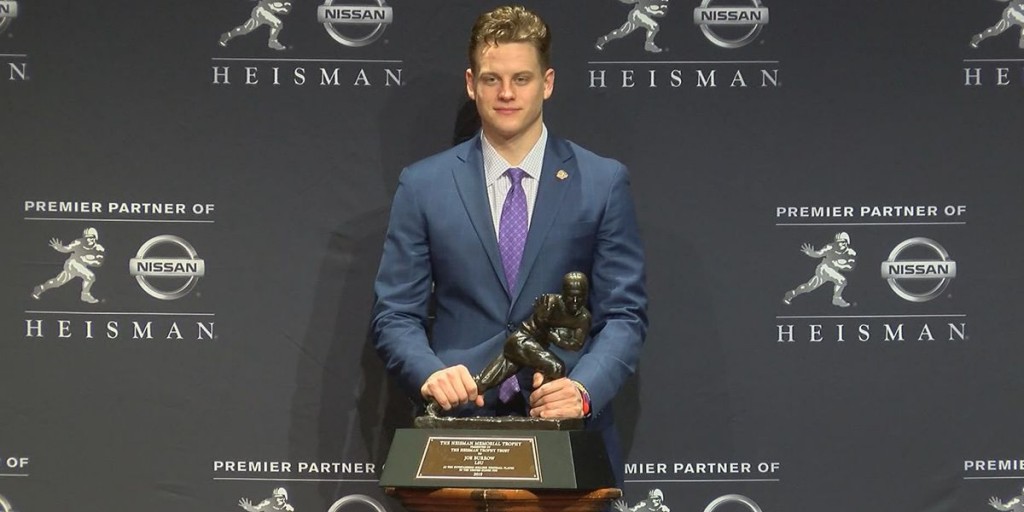LSU QB Joe Burrow is the 2019 Heisman Trophy winner.
WHO CARES!
For years, I have felt that the college football Heisman Trophy award is the most overhyped award in sports for many reasons, to include the following:
IT ISN’T REALLY FOR THE BEST PLAYER IN COLLEGE FOOTBALL.
It’s the best quarterback or running back in college football. Tim Brown and Desmond Howard won as primarily receivers. Charles Woodson, who also was a return man, is the only primary defensive player to ever win the award. How can we take any award seriously that espouses that the best player in college football has never been an offensive or defensive lineman, or a linebacker? I realize that there are various awards for various positions. The others are appropriately named. The Bednarik award goes to the best defensive player. The Outland award goes to the best lineman. They are what they purport to be. The only one of these awards that purports to be something it clearly is not on all too many occasions is the Heisman. This is a serious insult to defensive players, and especially lineman on either side of the ball. If games are won and loss in the trenches, why aren’t the players in those trenches considered to be the best?
HOW CAN THE BEST COLLEGE PLAYER AWARD BE SUCH AN UNPREDICTABLE GAUGE OF NFL SUCCESS?
Over 95% of NFL players come from the American College ranks. And yet, since the first Black Heisman winner in 1961, only 56% of its winners have been able to produce an NFL career of any note. That 56% does not include the only 2-time winner, which is Archie Griffin. That is to say that they either were a Pro-Bowl selection or won Rookie of the Year…something to say that the award was warranted as a predictor of NFL success. This is not mere hindsight analysis. At the time of many awards, clear superior players have been omitted in favor of the winner. In 1992, anyone with the slightest football acumen knew that Miami QB Gino Torretta was not better than Nebraska offensive lineman Will Shields. History barred that out as Torretta was a mere footnote in NFL history while Shields was recently inducted into the Pro Football Hall of Fame. Florida QB Danny Wuerffel wins in 1996 instead of the great Ohio State Tackle Orlando Pace. Pace is a Hall of Famer while Wuerffel was a hood ornament on the Steve Spurrier (another Heisman winner that amounted to nothing in the NFL) football Cadillac. Finally, Ohio State QB Troy Smith wins in 2006 instead of the great Wisconsin offensive tackle Joe Thomas. Thomas will be in the Hall of Fame soon. Smith will not, nor ever had a case to be. Maybe history will validate that Burrow is better than Defensive End Chase Young, his former teammate at Ohio State. But who among us can say you are convinced of that today?
This is not to say that the award has always been a wild card for NFL success. Its golden era in this regard were the winners from 1977 (Tony Dorsett) through 1988 (Barry Sanders). Others in this group included Marcus Allen, Billy Sims, Earl Campbell, Herschel Walker, Bo Jackson, and Tim Brown. To show that white winners did not have the market cornered on being flops, it was Andre Ware in 1989 that stopped the streak of greatness.

GATH 1/88: Football player Paul Hornung poses with the Heisman Trophy, December 1956.
GNEG Heisman notebook (no number)
Speaking of race, THE 3RD PROBLEMATIC ASPECT OF THE HEISMAN IS ITS HISTORY ROOTED IN JIM CROW SEGREGATION. The late great sports writer Dick Schapp gave up his Heisman vote in protest of the committee refusing to recognize the obvious best player in the country in 1956. The winner was Notre Dame QB Paul Hornung.
It was not because of how good Notre Dame was that year. They were 2-8.
It wasn’t because of his individual stats: He threw 3 TD passes against 13 interceptions.
It was because Schapp’s all white colleagues refused to vote for the “other guy”, who was a running back at Syracuse named Jim Brown.
In this case, Hornung would go on to be a Hall of Famer with the Packers and league MVP in 1960. The issue is that the racist attitudes of the times gave him a public relations head start, via winning a Heisman that he never should have won.
Why is any of this important? Within the context of sports, if independent thinking is not relevant to you, perhaps it is not. Both within and beyond sports, the “prestige” of the Heisman Trophy is yet another example of how all too often, folks in America are told what to think and value rather than engaging in the process of coming to conclusions for themselves. There is an intellectual herd mentality that too many follow for one of two reasons: either they are too lazy to actually do the work to vet the ideas being promoted as “gospel”, or they actually know that they are being fed BS, but simply don’t care to pay the price for calling it what it is.
I do not subscribe to the notion that the enjoyment of sports requires blind acceptance of traditional ideas. After all, tradition merely for the sake of tradition is often propaganda. To that end, I cannot think of a better place to intertwine the critical second guessing of traditions in sports than the prestige of the Heisman Trophy.

